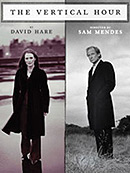
New York
I've been reading Schopenhauer. He's not exactly the most upbeat philosopher, certainly not a transcendentalist. Schopenhauer, a 19th century German scholar, hypothesized that we are all part of a collective Will, a Will that is wicked. So, of course, we are destined to a life of inescapable suffering. Schopenhauer suggests that one can escape the suffering with a great deal of perserverance--through denial, and through art. Why was I studying this pessimistic life view? Because it was my assignment in my fiction class to research Thomas Mann, German writer, Nobel Prize winner, and author of Death in Venice and Magic Mountain. Mann was profoundly influenced by Schopenhauer's philosophy. In fact, in my view, to understand his work, especially Death in Venice, his point of view becomes clear with this background knowledge.
The same human theme, man's suffering, and the outcome of that suffering, was the subject of both Broadway plays I saw this weekend. Color Purple's author, Alice Walker, does not subscribe to the Schopenhauer, we-can't-change-anything-just-suffer-through viewpoint. Celie, Sug, even Albert, the angry, abusive husband are transformed during the play, offering hope to the rest of us. Or as Celie, once penniless owns a house and a little business sings at the finale: " I am free, I am here".
Bill Nighy, the brilliant British actor, plays 60 year old, reclusive physican, Dr. Lukan, in Vertical Hour. His view on the war in Iraq is juxtaposed with Julianne Moore's character, Nadia, a Yale poli sci professor, The entire play occurs in one evening at Lukan's Welch country home and centers around the debate that ensues. Lukan beleives the war is a mistake, badly handled; Nadia believes in our role in coming to the aid of the oppressed.
But the play's really about suffering which emerges over the course of the evening. Nadia has lost her passion for life since she stopped her activist lifestyle as a journalist in Bosnia. Lukan has retreated to the country after accidentally killing a mistress in a car crash, a betrayal his wife never forgave.
Both suffer; both have lost their passion for life.David Hare, the playright, seems to lean toward the Schopenhauer view--there really is no redemption, no transformation.
I have spent my life holding the view that we are transformable, able to become better; that life will reward hope and effort, kindness, focus on other. That if you're good, you'll prevail--you'll win the fight just like Rocky Balboa. Isn't that right?
That brand of hope is dimming for me, perhaps to be replaced with another form. I don't know. What I do know is that living passionately takes a certain amount of courage. But there's sure not quid pro quo ---living with integrity will net rewards. I don't think so. If you're lucky, the joys outpace the disappointments whether you are "good" or not.
So, I'm somewhere between Schopenhauer and the transcendentalists. Sometimes you are transformed/redeemed after a long bout of suffering, sometimes not. But, the possibility of transformation, of change, of a graced moment with a loved one is worth the risk of despair. Isn't that right?
M.C.
2 comments:
You are a marvelous writer and it has been a joy to enjoy your blog this year. Just stopping by to wish you a very Merry Christmas!
at a pretty influencial age, there was a banner i remember hanging, that said when you love you risk crying... at the innocent age of 12, i didn't get it, after loving/crying, growing, reaching and still sometimes crying, i get it. and I LOVE YOU
Post a Comment